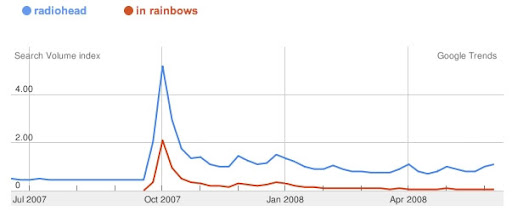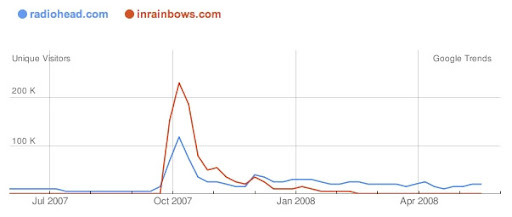Friday, June 20, 2008
Two years ago, we launched Google Trends, a tool that lets anyone see what the world is searching for, and compare the world's interest in your favorite topics. Last year, we added Hot Trends, which shows what people are searching for right now—the fastest rising search queries on Google, updated every hour. And just last week, we introduced normalized search volume numbers available for export in Google Trends.
Today, we add a new layer to Trends with Google Trends for Websites, a fun tool that gives you a view of how popular your favorite websites are, including your own! It also compares and ranks site visitation across geographies, and related websites and searches.
Let's take a look at one example, the release of Radiohead's In Rainbows album. As part of our annual Zeitgeist, we post the fastest rising search terms, and this past year, radiohead took the crown as the fastest rising search term in the last quarter of 2007.
Using Google Trends, we can see the search volume for radiohead compared to in rainbows over the last 12 months.

With Hot Trends, we can see that on October 10th (the release date of In Rainbows), people were most interested in downloading In Rainbows and reviews of the new release.
Now, using Trends for Websites, this story can be viewed from another perspective: we can see how the number of unique visitors that visit radiohead.com and inrainbows.com has changed over the last 12 months, the countries where the sites are most popular, the top related sites and search terms.

We can see that in October 2007, radiohead.com (the blue line) saw a huge surge in popularity. The release of In Rainbows clearly drove many people to visit the band's website. The album's website, inrainbows.com (the red line), saw an even more dramatic jump; probably because that is where you could actually download the new album. And, it looks like site traffic to radiohead.com has increased overall, even as inrainbows.com traffic declined.
Keep in mind that Trends for Websites is a Google Labs product and that we are experimenting with ways to improve the quality of the data. Because data is estimated and aggregated over a variety of sources, it may not match the other data sources you rely on for web traffic information. For more information, be sure to check out our Website Owners FAQs.
To start using Trends for Websites, head over to Google Trends.
